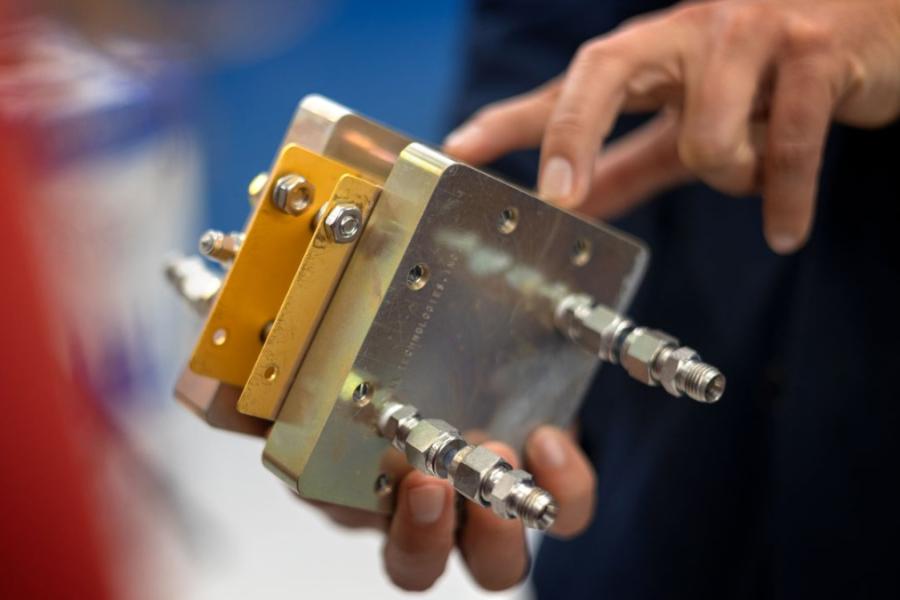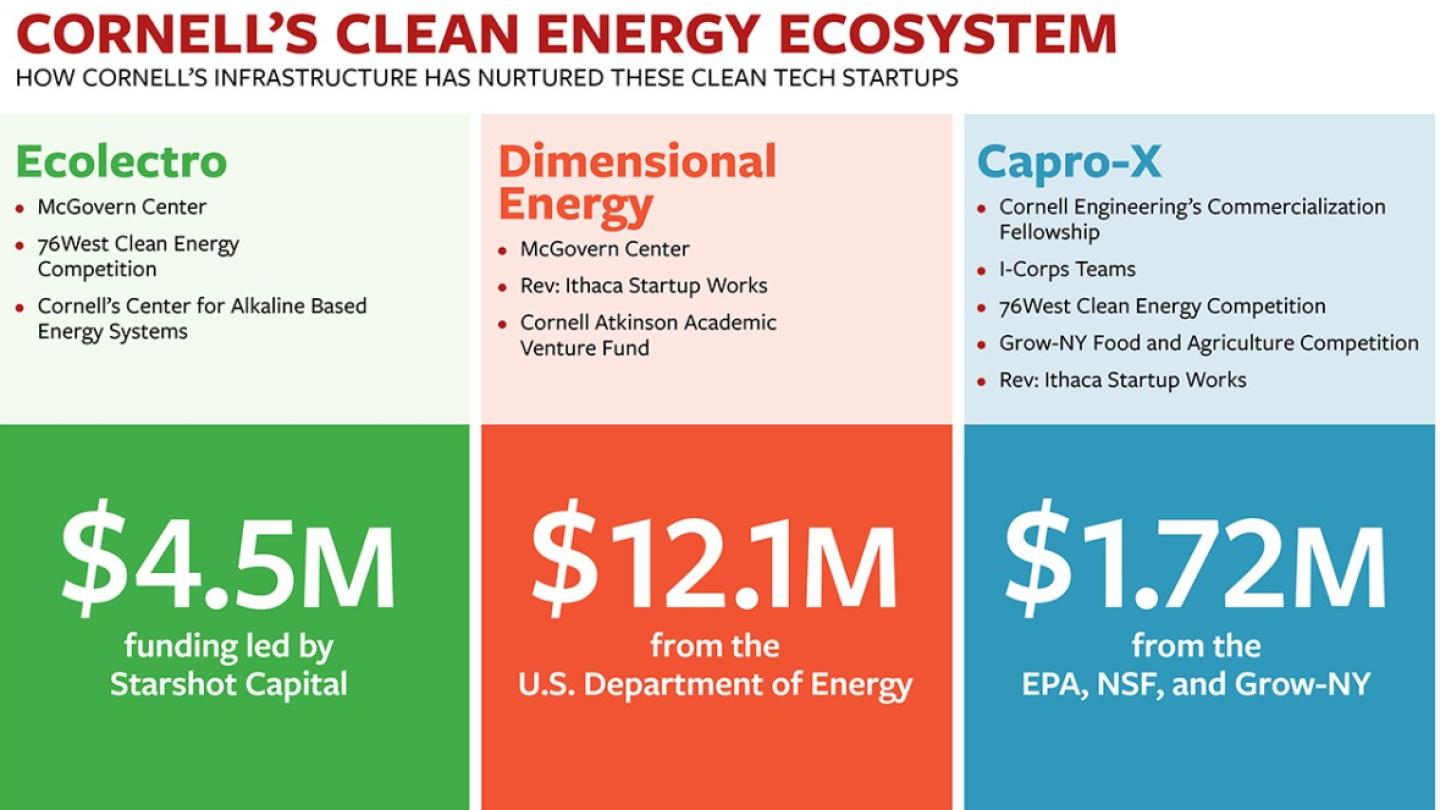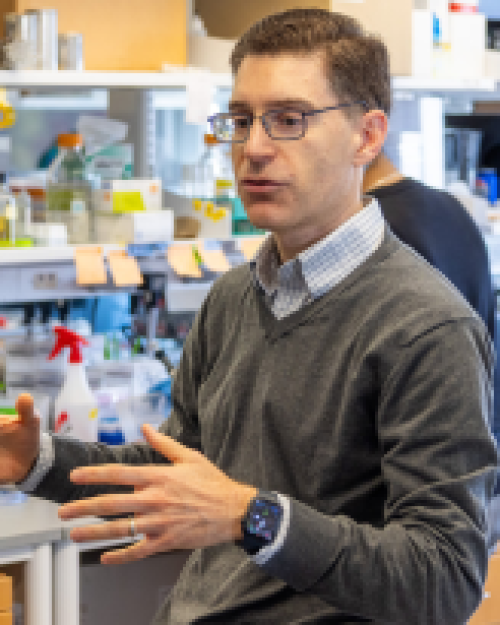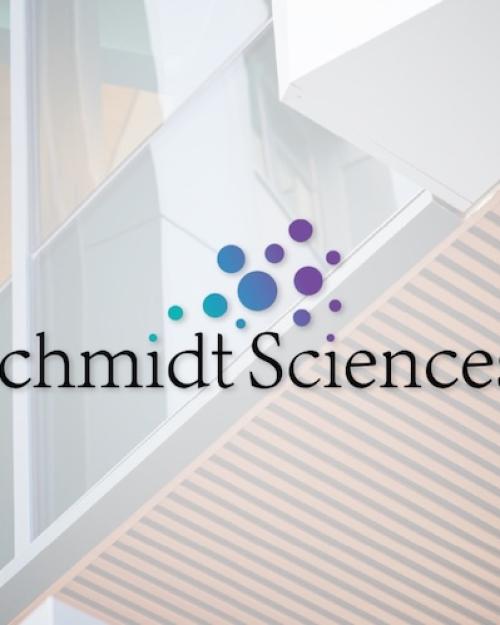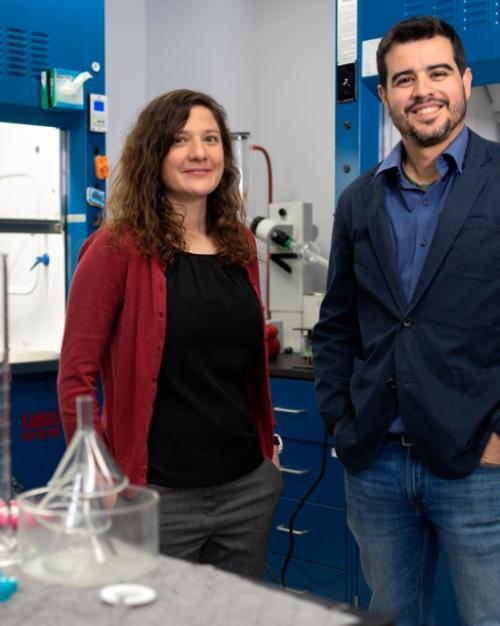When Kristina Hugar was working on her Ph.D. at Cornell, she wasn’t just doing science for science’s sake.
“I care very deeply about the environment and climate change, and I wanted to figure out a way to focus my career and life on addressing the defining crisis of our time,” said Hugar, M.S. ’12, Ph.D. ’16, whose dissertation research improved alkaline exchange membrane materials to make alternative energy sources more effective.
She, like scores of other clean energy entrepreneurs, have found at Cornell an innovative, powerful ecosystem that supports the transition to a sustainable and decarbonized economy.
It was Cornell’s clean energy ecosystem that made Hugar’s vision a reality. As she was completing her Ph.D. in 2015, a Cornell colleague – Gabriel Rodríguez-Calero, M.S. ’12, Ph.D. ’14 – proposed they collaborate to commercialize her research. In June 2015, they founded Ecolectro to create a cleaner, cheaper and more scalable green hydrogen – a crucial step in achieving a decarbonized economy, Rodríguez-Calero said. “Hydrogen is a $150 billion market. Most people don’t realize that it’s used in the production of everything from fertilizer to peanut butter.”
The strong foundation startups have found in Cornell’s clean energy ecosystem has helped them attract significant outside funding.
Ecolectro recently closed a $4.5 million funding round led by Starshot Capital with support from investors including Toyota Ventures. And it just joined a new consortium aiming to create a Northeast research hub focused on hydrogen energy.
Dimensional Energy, co-founded by two Cornell faculty members and alumni, won $3.1 million from the U.S. Department of Energy (DOE) earlier this year – part of $7 million in federal grants awarded to Cornell researchers and startups to advance novel clean energy research. And in the agriculture sector, Capro-X, which upcycles dairy waste, has received $100,000 from the U.S. Environmental Protection Agency and $1.374 million in National Science Foundation Small Business Innovation Research grants.
These and many other fledgling companies have leveraged support from Cornell resources such as the Kevin M. McGovern Family Center for Venture Development in the Life Sciences and the 76West Clean Energy Competition, which is administered by Cornell and funded by the New York State Energy Research and Development Authority (NYSERDA).
“McGovern provided us with the kind of collegial environment you would associate with being a part of a much larger company and exposure to vital connections,” Rodríguez-Calero said. “And participation in 76West gave us the opportunity to communicate the potential impact of green hydrogen to a larger audience.”
New resources for clean energy
Cornell’s clean energy ecosystem includes new programs designed to support entrepreneurs working toward climate solutions.
Diversity in ClimateTech recruits, educates, inspires and supports capitalization for clean energy founders who are Black, Indigenous, people of color and women. The ClimateTech Prototyping Hardware Accelerator at Rev: Ithaca Startup Works provides clean energy entrepreneurs with state-of-the-art prototyping lab space and materials, one-on-one mentorship and networking opportunities. Both programs receive funding from NYSERDA.
The 2030 Project: A Cornell Climate Initiative, launching this year and housed in the Cornell Atkinson Center for Sustainability, will harness Cornell’s strengths in collaborative scholarship and entrepreneurship and aims to mobilize investors and collaborators to accelerate the development of large-scale climate change solutions.
“With the 2030 Project, we aspire to translate transdisciplinary research and expertise across Cornell into solutions and actions for a safer, healthier, decarbonized world,” said Benjamin Z. Houlton, the Ronald P. Lynch Dean of the College of Agriculture and Life Sciences and a co-chair of the initiative. “As we respond to urgent climate challenges, entrepreneurs and innovators working on clean technologies and carbon dioxide removal are essential partners in our efforts to demonstrate and scale breakthrough solutions, with a focus on inclusive pathways for a better, brighter future.”
And in 2021, the College of Engineering hired David Putnam, its first associate dean for innovation and entrepreneurship.
“Our aspiration is to be the first college of engineering that consistently comes to mind when people talk about who does entrepreneurship right, including in the clean technology space,” said Lynden Archer, the Joseph Silbert Dean of Engineering. “Our faculty are involved in a range of groundbreaking initiatives, including researching wireless charging for electric vehicles, developing cost-effective batteries that use earth-abundant materials like aluminum and zinc, and pioneering photocatalytic processes that convert carbon dioxide emissions from power plants into a low-carbon, synthetic jet fuel.”
Offering support to emerge from the lab
In 2016, two Cornell engineering professors each applied separately for funding from NEXUS-NY, a clean energy business accelerator funded by NYSERDA. NEXUS-NY recognized the similarity of their ideas and introduced them.
From there, the professors – David Erickson, the S.C. Thomas Sze Director of the Sibley School of Mechanical and Aerospace Engineering and Tobias Hanrath, the Marjorie L. Hart ’50 Professor in Engineering in the Smith School of Chemical and Biomolecular Engineering – co-founded Dimensional Energy with NEXUS-NY mentor Jason Salfi ’92.
Dimensional Energy uses its innovative reactor, based on Cornell research, to harness sunlight and hydrogen produced through electrolysis to transform captured carbon dioxide into energy-dense synthetic gas. This “syngas” can be converted into products typically reliant on fossil fuels. The startup’s first offering is a low-carbon and high-performing jet fuel.
As Dimensional Energy gained traction and hit technical milestones, Cornell offered the support it needed to emerge from the lab, says Salfi, CEO and co-founder. “McGovern provided space on campus to do catalyst research and safely test our reactor, allowing us to accelerate our growth and ability to pilot our tech in the field – a pilot funded by a seed round largely filled in by our extended Cornell family,” he said. “Having coworking space at Rev that is networked nationally signals Ithaca and Tompkins County’s commitment to building a vibrant startup community.” The startup also received valuable support from the Academic Venture Fund through Cornell Atkinson.
That strong foundation has attracted strong funding opportunities. Dimensional Energy has received over $6 million in grants from the DOE’s Advanced Research Projects Agency-Energy (ARPA-E) and Solar Energy Technologies Office, closed a $3 million seed round and competed as a finalist in the $20 million Carbon X Prize competition. The startup plans to use its most recent $3.1 million in funding from ARPA-E to 3D-print ceramic components for its reactors that can run on low-carbon electricity sources.
Meanwhile, Capro-X, co-founded by Juan Guzman, M.S. ’14, Ph.D. ’17, and Largus T. Angenent, a former Cornell associate professor, is working toward elevating sustainability in the dairy industry by upcycling a byproduct of Greek yogurt.
Capro-X’s fermentation technology is based on research conducted in Angenent’s Cornell laboratory. WheyAway, the startup’s biotech solution, uses naturally occurring nonGMO microbes to turn the waste into clean water and environmentally friendly chemicals used in consumer products.
Each cup of Greek yogurt produces three cups of acid whey waste that needs to be trucked – increasing greenhouse gas emissions – to other farms for feed and fertilizer or wastewater treatment plants for processing. New York is the largest producer of yogurt in the country, and its producers create 300,000 gallons of acid whey waste daily.
The company projects that by treating just 10% of the acid whey waste produced in New York, it can yield 500,000 gallons of environmentally friendly chemicals annually and prevent 10,000 tons of greenhouse gas emissions caused by trucking the waste to other sites. Capro-X won a $250,000 prize in the 2019 Grow-NY food and agriculture competition, administered by Cornell’s Center for Regional Economic Advancement.
“Looking back, the opportunities and experiences that I was afforded as a student gave me a strong foundation to build a science-based startup from scratch,” said Guzman, CEO. “Cornell’s entrepreneurship ecosystem really makes this area ideal for growing a new company.”
The company is now fundraising to continue growing its team with the goal of marketing their green chemicals later this year, and installing its first commercial system in 2024.
Ecolectro’s new funding will advance the commercialization of its next-generation technology, which eliminates the need for the rare metals found in today’s fuel cells and electrolyzers, making green hydrogen production cheaper and reducing reliance on rare metals.
Its technology illustrates the power of Cornell’s clean energy ecosystem. The tech grew out of collaborative research in the College of Arts and Sciences in the laboratories of Héctor D. Abruña, the Emile M. Chamot Professor of Chemistry, and Geoffrey W. Coates, the Tisch University Professor of Chemistry, with whom Hugar completed her graduate research. Both professors are scientific advisors to Ecolectro – Coates is also a scientific co-founder – and Cornell Atkinson fellows; their laboratories are part of Cornell’s Center for Alkaline Based Energy Systems.
“I am a big believer in the power of Cornell’s networks,” said Rodríguez-Calero. “We have leveraged these to find investors, development partners and employees, many of whom attended or are affiliated with Cornell.”
Sara Baier is a senior marketing and communications specialist for the Center for Regional Economic Advancement.
